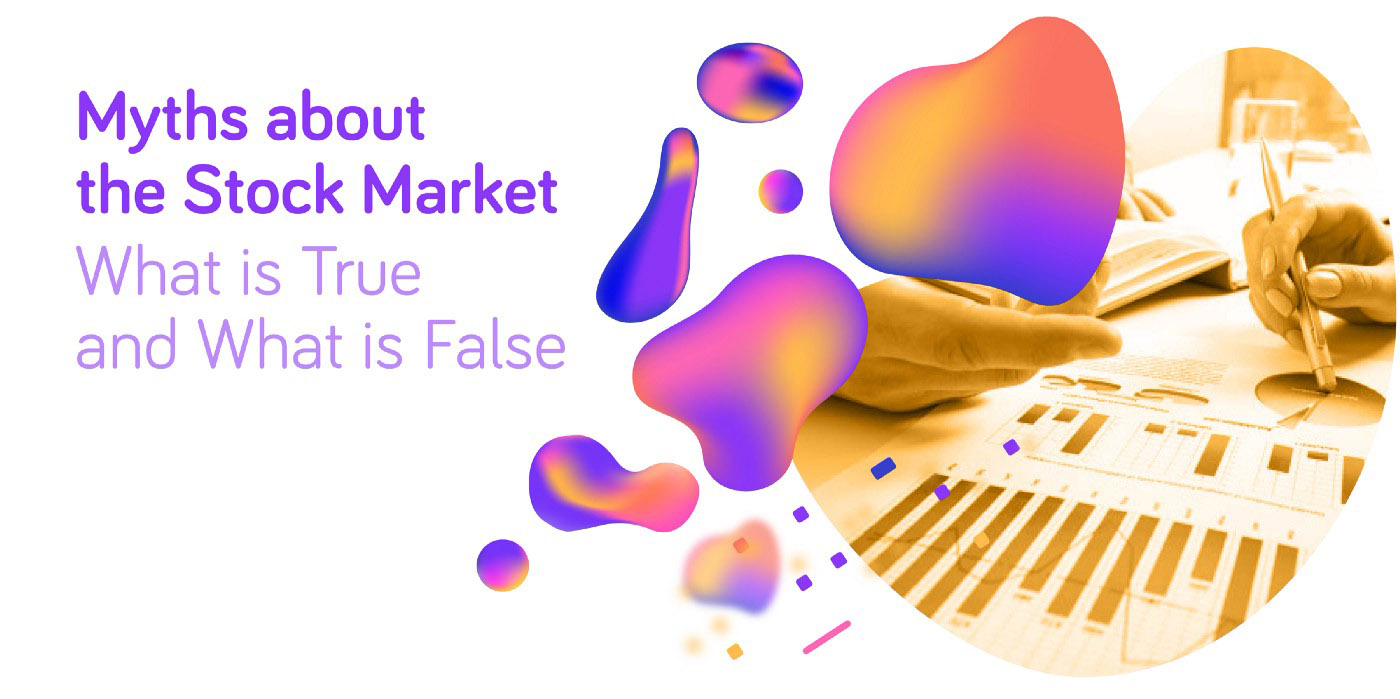Almost every day, on almost every news channel, we hear something about the stock market and the companies that are being traded publicly over there.
Most of the time, the information is about the market going up, or the market going down, or about various myths that have been perpetuated over the years.
In this article below, we will analyze the most common myths and also, we will determine if they are true or false. Let’s begin.
The Myth: Investing is only for the rich people
True / False: False
Nowadays, investing is actually open for everybody.
This is due to the fact that most of the brokers have decreased their trading commissions (sometimes they ask no commission at all), they have also decreased the minimum amount of money for opening an investment account.
Also, now is quite common for the broker to offer the option to buy only a fraction of a share. Not all of them do it, but the important thing is that some of them are offering it.
The Myth: You only make money when you sell
True / False: False
Actually, there are financial instruments which you buy and hold, and they return an interest on a regular time basis (yearly, quarterly, etc.) — they are called bonds.
This means that you can create a system of passive income, based on the interest returned by various bonds — generally they have different payment dates, and if you buy them with attention to the payment date, you can create a system for you that will bring you passive income payments every month of the year. Cool, right?
The Myth: Investing is risky
True / False: True
Yes, investing is risky, but so is driving a car. Everything we do, every day, has a certain degree of risk. So, it’s not about if investing is risky or not, it’s about how risky it is: what is the associated level of risk. This is the key message.
Once we understand how the various securities (financial instruments) work, what are their specific risks and how they can be mitigated, the risk is no longer an issue. Actually, not knowing what you are doing (what you are investing in) is the greater risk.
On the other hand, the risk of having a flat tire has never stopped anybody from driving around in their car.
The Myth: The stock market is what you see in the movies
True / False: False
The movies usually depict a negative picture of the stock market, with greedy brokers that are always going only one thing: tricking the investors into buying various instruments under the pressure of time, and always calling them on the phone to push them into taking a quick decision in a few minutes.
In real-life, the investor has the control: he / she decides when to buy, when to sell, when to hold. This is because the broker offers (most of the times) only the online interface between the investor and the stock market. And yes, investing is done online.
Perhaps there are still a few stock markets where the transactions are done face to face (in the pit / on the trading floor), but these are an exception, not the rule.
The Myth: A few select people know which direction the market is going
True / False: False
Nobody knows when the market goes up or down. This is the truth.
However, this will not stop people to say, from time to time, that they know when the market will go up, when the market will go down, and ask you to invest according to their predictions. If / when you hear them, stay away from them, and remember that almost every study conducted to verify this kind of statements has proven that their assumptions were false.
Statistically, it has been proven that on the long term (10–20–30 years or more), the stock market goes up. This is valid for the majority of the markets, all over the world. This is the reason why the easiest way to invest is on the long term — because there are great chances that on the long term, that investment will grow continuously.
The Myth: Investing is like gambling
True / False: False
Investing is a process with clear input and clear output (money in / money out). Maybe there are a few unknown elements, but they are not significant. You can understand page how the money-making takes place, and you can understand how to influence it yourself or what are the external influencing factors.
On the other hand, gambling is characterized by the fact that you cannot influence the outcome. The result does not depend on you and you cannot influence it. Actually, the main definition of gambling is that nobody should be able to influence the result.
Now, if you look from outside at the stock market, and if you do not understand what happens there — yes, you could say that it’s similar to gambling. But once you know how it works, you cannot say that anymore.
The Myth: You have to buy what is mentioned in the news
True / False: False
Actually, this is the worst thing that an investor could do.
When that financial instrument (stock, bond, etc.) is mentioned in the news, it is very late to buy it. It has been observed that the moment when it is mentioned in the news coincides with the moment when the price is at a maximum, and therefore the buy opportunity is long gone.
The Myth: You have to invest only at the “right time”
True / False: False
Many people tend to believe that there are good times to invest in the stock market, and that there are bad times to invest in the stock market. In fact, there is no “right time” for investing. The best action to do is to invest periodically.
A consequence of this belief is the fact that many novice investors are being tricked by the news (which almost constantly warn about an imminent stock market crash) and they wait for years and years to start investing, being justified by the reason “now is not a good time to invest — I should wait for the crisis to pass and after that I will start my investing activities”.
Unfortunately, while they wait “for the crisis to pass”, other investors who do not make investment judgement based on news, start investing and accumulating and eventually, winning!
With regards to this, I wrote below a bad action and a good action.
Bad action: “timing the market” — trying to enter the market on low values and exit on high values.
Good action: “time in the market” — buying periodically regardless of low values or high values.
The Myth: Investing consumes a lot of your time
True / False: True and False
It depends on what kind of investing you are doing.
If you buy and sell securities very often (daily maybe) then yes, investing takes a lot of time — because you have to be connected to the economic news, because these are influencing the price on the short term.
But if you are focused to get results on the long term, then whatever happens in one day has no influence on your strategy — therefore you do not need to be connected to the news every day. In consequence, investing will not take a lot of time.
In my personal example, I check the portfolio every day for 5 minutes to check the performance and track it down in my charts, but after that, I close the broker’s platform and continue with my life. This is possible because my strategy is “buy and hold” and I make my purchases on a monthly basis, not a daily one.
The Myth: You need to be an economic school graduate to invest
True / False: False
Of course, it is useful to have an economical background because you will understand easier the terms discussed in connection with various securities.
But if you know nothing about stock market, you can learn what is minimum required to know, in just a few months.
It’s like driving a car: you do not need to know in specific details how all of the components of the car works. You just need to know how to drive the entire assembly (the car).
Much more important than knowing the financial terms, is mastering your emotions. Because, in the end, the stock market is a game of emotions. And the two great emotions that are affecting the investor are (1) GREED to win it all and (2) FEAR to lose it all. Focus your energy to master these emotions and you will have a happy life as a stock market investor!
Now that you have understood what are the major myths concerning the stock market, don’t consider you know everything and go sell your house and invest all of the money from the sale — that would be very unwise!
Instead, you can take an educated decision if the stock market really is for you or not.
Disclaimer: The content of this article is not investment advice and does not constitute an offer or solicitation to offer or recommendation of any investment product. It is for general purposes only and does not take into account your individual needs, investment objectives and specific financial and fiscal circumstances.
Although the material contained in this article was prepared based on information from public and private sources that IXFI believes to be reliable, no representation, warranty or undertaking, stated or implied, is given as to the accuracy of the information contained herein, and IXFI expressly disclaims any liability for the accuracy and completeness of the information contained in this article.
Investment involves risk; any ideas or strategies discussed herein should therefore not be undertaken by any individual without prior consultation with a financial professional for the purpose of assessing whether the ideas or strategies that are discussed are suitable to you based on your own personal financial and fiscal objectives, needs and risk tolerance. IXFI expressly disclaims any liability or loss incurred by any person who acts on the information, ideas or strategies discussed herein.




